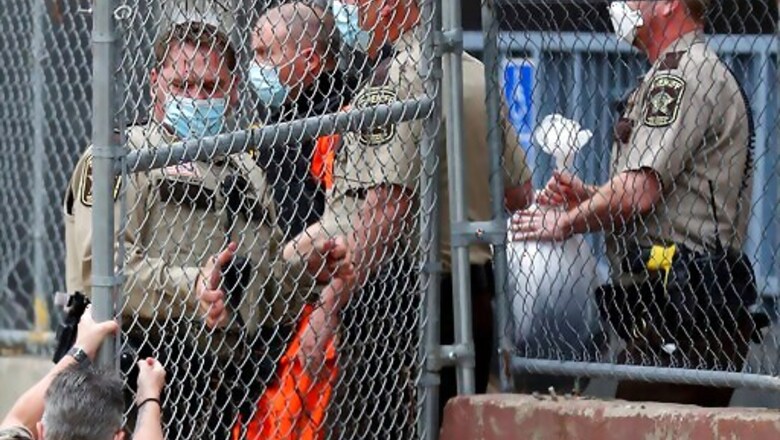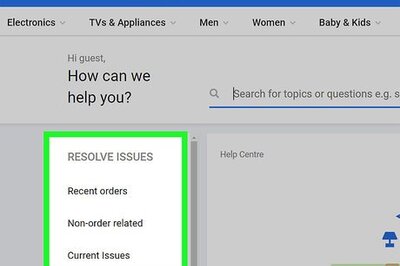
views
MINNEAPOLIS: A proposal by Gov. Tim Walz to create a $35 million fund to bolster security during the murder trial of a former Minneapolis officer charged with killing George Floyd stalled out in the Democratic-controlled Minnesota House on Monday when leaders pulled the bill, acknowledging that they lacked enough votes to pass it.
With just three weeks left before the trial, House Majority Leader Ryan Winkler, of Golden Valley, abruptly moved to postpone the debate indefinitely after accusing the Republican-controlled Senate of a cynical and amoral political game, playing with people’s lives.” Legislative leaders and the governor must now scramble to find an alternative or make do with existing resources.
Instead of providing state money, the Senate voted 35-32 to pass a very different proposal that would allow the state to garnish money that Minneapolis gets from the state’s Local Government Aid program to ensure that other law enforcement agencies are reimbursed for their costs of contributing officers for what’s expected to be a massive security effort.
Democratic House Speaker Melissa Hortman, of Brooklyn Park, acknowledged at a news conference that House Democrats, who hold just a 70-64 majority, werent united. She said they needed a few Republican votes” to pass the bill but were told they werent getting any.
Winkler said before cutting off the debate that it was impossible to meet the Senate halfway. He accused GOP senators of using their debate to demonize, attack and make worse the trauma of people who’ve suffered so much already.
Walz had proposed a $35 million State Aid and Emergencies (SAFE) account that would reimburse local governments, not just Minneapolis, for providing mutual aid for unplanned or extraordinary public safety events. They would include, but not be limited to, the trial of Derek Chauvin, which is expected to draw worldwide attention when it begins March 8, and the trial in August of three other ex-officers charged in the case.
Local, state and federal authorities have been preparing for demonstrations and potential civil unrest for months. They fear a repeat of violence that erupted after protests began in Minneapolis and spread worldwide, leading to a national reckoning over race. Floyd, a Black man in handcuffs, died May 25 after Chauvin, who is white, pressed his knee against Floyds neck for several minutes while Floyd said he couldnt breathe.
Walz authorized the Minnesota National Guard earlier this month to deploy in preparation. But the Guard is not considered a law enforcement agency, and it must partner with police to prevent or respond to any unrest. He had said the SAFE account would ensure there are enough officers on the ground. The governor came under Republican criticism last summer for not sending in the Guard sooner to quell the unrest.
Senate Republicans said in the debate on their bill that Minnesota taxpayers and other communities should not have to bail out Minneapolis, where the police department is more than 200 deployable officers under its authorized strength and some council members have pushed to defund or dismantle the department. Republican Sen. Bill Weber, of Luverne, also cited the city’s $8 million cut to its police budget.
Senate Majority Leader Paul Gazelka, of East Gull Lake, said Minnesotans across the state are “very, very frustrated with the City of Minneapolis, the leadership that over and over and over talked about defunding the police, and worse than that, on a regular basis, spoke terribly about them.
Democrats and groups that represent Minnesota cities and counties said the mutual aid system already works well. They warned against undermining a system that benefits communities large and small across the state. Sen. Erin Murphy, of St. Paul, cited several examples of communities helping each other in disasters and emergencies, including last week’s shooting at a medical clinic in Buffalo, Minnesota, that left one person dead and four others injured.
“We are here today bringing a solution to a problem that doesnt exist, she said.
Hortman told reporters she is already in discussions with Gazelka and House Republican leaders about what comes next. Winkler said preparations for Chauvin’s trial will go forward and are not dependent on approval of the SAFE account.
Disclaimer: This post has been auto-published from an agency feed without any modifications to the text and has not been reviewed by an editor
Read all the Latest News, Breaking News and Coronavirus News here















Comments
0 comment